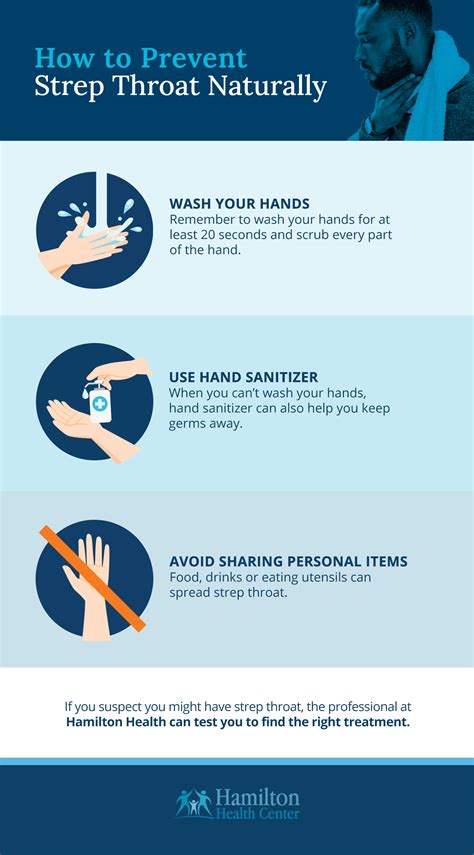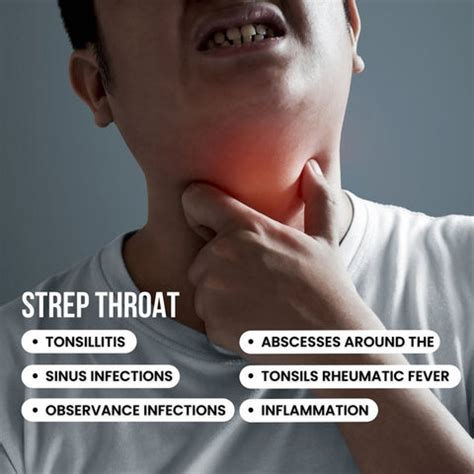Intro
Ease strep throat symptoms with self-care tips, including sore throat remedies, pain relief, and natural treatments to boost recovery and prevent complications, promoting swift healing and comfort.
Strep throat is a highly contagious and common illness that affects millions of people worldwide every year. It is caused by the group A Streptococcus bacteria and can lead to severe complications if left untreated. While antibiotics are often prescribed to treat strep throat, there are several self-care tips that can help alleviate symptoms, promote recovery, and prevent the spread of the infection. In this article, we will explore the importance of self-care in managing strep throat and provide practical tips to help you recover quickly and effectively.
Strep throat can be a debilitating illness that interferes with daily life, causing symptoms such as sore throat, fever, headache, and fatigue. If you or a loved one is experiencing these symptoms, it is essential to seek medical attention to determine the cause of the illness and receive proper treatment. However, in addition to medical treatment, self-care plays a vital role in managing strep throat and preventing complications. By incorporating simple self-care tips into your daily routine, you can help reduce the severity of symptoms, promote recovery, and prevent the spread of the infection to others.
The importance of self-care in managing strep throat cannot be overstated. Self-care tips such as staying hydrated, getting plenty of rest, and practicing good hygiene can help alleviate symptoms, promote recovery, and prevent complications. Moreover, self-care can also help reduce the risk of spreading the infection to others, which is essential in preventing outbreaks and protecting vulnerable individuals such as the elderly, young children, and people with weakened immune systems. By prioritizing self-care and taking proactive steps to manage strep throat, you can take control of your health and well-being, reduce the risk of complications, and promote a speedy recovery.
Understanding Strep Throat

Causes and Risk Factors
The causes and risk factors of strep throat are essential in understanding how to prevent and manage the infection. Strep throat is caused by the group A Streptococcus bacteria, which can be spread through close contact with an infected person. The risk factors for strep throat include age, with children and adolescents being more susceptible to the infection. Additionally, people with weakened immune systems, such as those with chronic illnesses or taking immunosuppressive medications, are also at higher risk of developing strep throat.Self-Care Tips for Strep Throat

Home Remedies for Strep Throat
Home remedies can be an effective way to alleviate symptoms and promote recovery. Here are some home remedies for strep throat: * Honey: Honey has antibacterial properties that can help kill bacteria and soothe a sore throat. * Lemon: Lemon has antiseptic properties that can help reduce inflammation and kill bacteria. * Garlic: Garlic has antibacterial properties that can help kill bacteria and boost the immune system. * Chicken soup: Chicken soup has anti-inflammatory properties that can help reduce swelling and promote recovery.Preventing the Spread of Strep Throat

When to Seek Medical Attention
While self-care and home remedies can be effective in managing strep throat, it is essential to seek medical attention if you are experiencing severe symptoms or if you are at risk of developing complications. Here are some scenarios where you should seek medical attention: * If you are experiencing severe symptoms, such as difficulty swallowing or breathing. * If you have a fever over 101.5°F (38.6°C). * If you have a sore throat that lasts for more than 48 hours. * If you are at risk of developing complications, such as kidney inflammation or rheumatic fever.Complications of Strep Throat

Treatment Options for Strep Throat
Treatment options for strep throat typically involve antibiotics, which can help kill the bacteria and promote recovery. Here are some treatment options for strep throat: * Antibiotics: Antibiotics are the primary treatment for strep throat and can help kill the bacteria and promote recovery. * Pain medications: Pain medications, such as acetaminophen or ibuprofen, can help relieve symptoms such as headache and fever. * Throat sprays: Throat sprays can help numb the throat and relieve sore throat symptoms.Conclusion and Final Thoughts

What are the symptoms of strep throat?
+The symptoms of strep throat include sore throat, fever, headache, fatigue, and swollen lymph nodes.
How is strep throat diagnosed?
+Strep throat is diagnosed through a physical examination, medical history, and laboratory tests such as a throat culture or rapid strep test.
What are the treatment options for strep throat?
+Treatment options for strep throat include antibiotics, pain medications, and throat sprays.
Can strep throat be prevented?
+Yes, strep throat can be prevented by practicing good hygiene, avoiding close contact with others, and getting vaccinated against the flu.
What are the complications of strep throat?
+The complications of strep throat include kidney inflammation, rheumatic fever, abscesses, and sinusitis.
